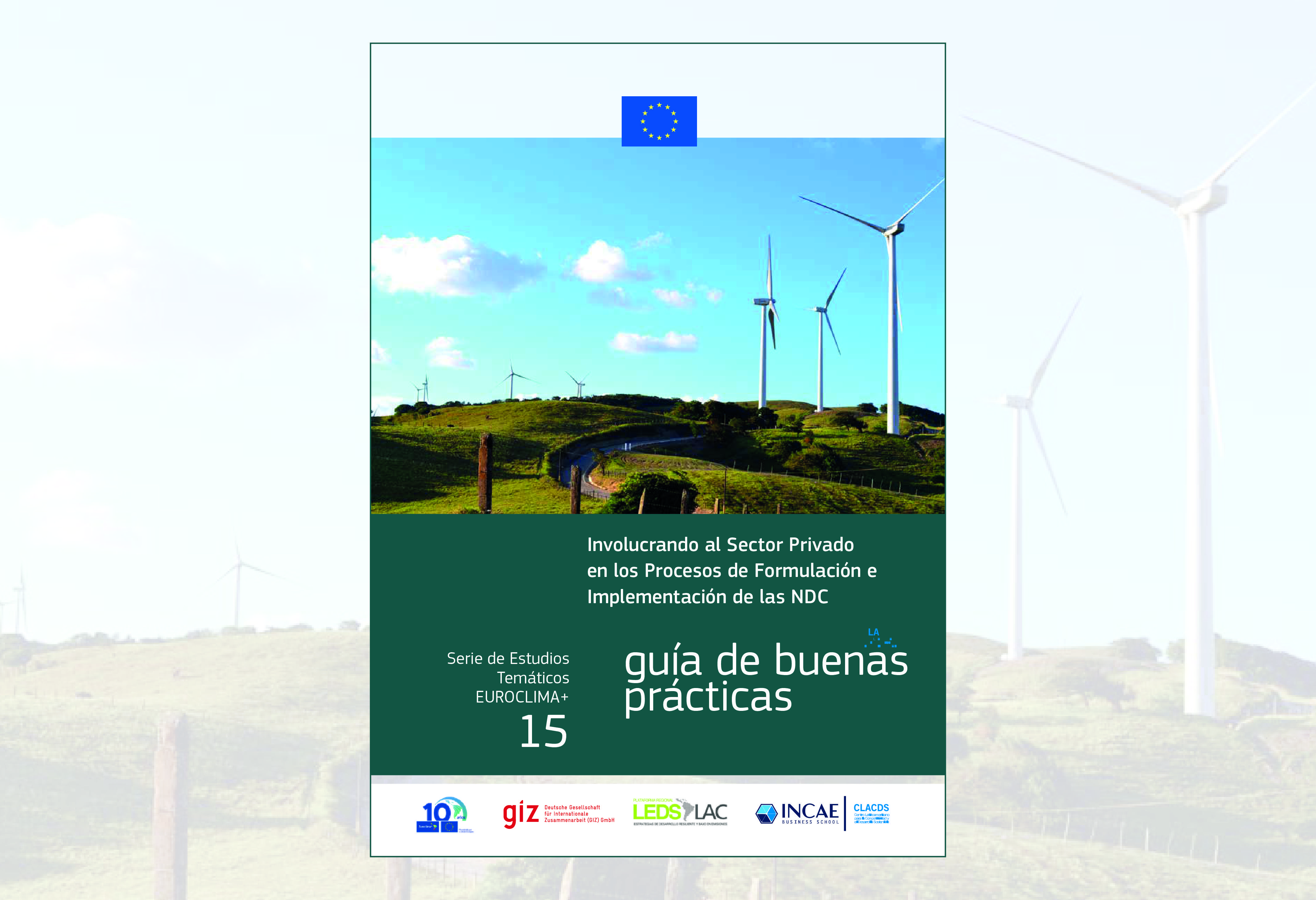The study was launched in an online session, which also included a panel discussion of experiences from Chile and Peru.
San José, November 9, 2020. The Community of Practice (CoP) on Private Sector Engagement in Climate Policy Processes launched Thematic Study 15 entitled "Engaging the Private Sector in the formulation and implementation of NDC son October 30. Guide to best practices ", which was prepared as part of its systematisation and knowledge dissemination activities. The document can be downloaded from the EUROCLIMA+ (direct link here) and LEDS LAC (direct link here) websites. The launch took place as part of the joint regional event Climate Action in Times of Crisis, organised by EUROCLIMA+, IDB, UNDP and the LEDS LAC Platform.
The CoP is a joint initiative of the EUROCLIMA+ Programme, through the German Society for International Cooperation (GIZ), under the framework of the action line for articulation with the private sector, the LEDS LAC Regional Platform, and the Latin American Centre for Competitiveness and Sustainable Development of the INCAE Business School. Teams made up of public and private organisations from 8 countries of the EUROCLIMA+ Programme are participating in this project: Mexico, Honduras, Costa Rica, Ecuador, Peru, Chile, Argentina, and Uruguay.
The Best Practices Guide aims to systematise lessons from past and ongoing processes around five key elements for effective private sector participation that have been identified in the COP framework: the existence of clear and consistent policies, regulations and incentives; adequate methodologies for systematic private sector involvement; preparation for participation; financing; and monitoring and reporting of private sector climate action. The objective of the Guide is to promote the incorporation of private sector perspectives, needs, and innovation capacity to make climate strategies and targets more feasible and ambitious.
The welcome to the event was given by Silvia Brugger, Climate Governance Coordinator for EUROCLIMA+ of GIZ, who commented on the work of the Community of Practice; as well as Joseluis Samaniego, Director of ECLAC's Sustainable Development and Human Settlements Division, who emphasised the importance of public policies as a framework for corporate decision-making. A brief presentation of the Guide was then given by Ana María Majano, Coordinator of the COP.
In the presentation it was stated that the document is the result of a collective effort, as it was built on the discussions of the Cop members and a mapping of experiences that included a survey of government representatives, analysis of cases that had been presented at the Community sessions, a Reading of regional reports and interviews to deepen the understanding of concrete experiences. The Guide was discussed and adjusted with the input of an editorial committee made up of 6 members of the Community of Practice from Argentina, Chile, Costa Rica and Honduras, as well as the GIZ teams, the EUROCLIMA+ Secretariat, LEDS LAC, and INCAE.
After the presentation of the document, a panel was held, moderated by Pablo Rojas, Regional Advisor for Climate Governance and the Private Sector of GIZ and EUROCLIMA+, with the participation of María Carolina Urmeneta, Head of the Climate Change Office of the Chilean Ministry of the Environment, and Carlos Adrianzen, Manager of Environmental and Institutional Affairs of the Peruvian company CELEPSA, both member organisations of the CoP.
Ms. Urmeneta shared the experiences and lessons learned by the Chilean government in the design of participatory processes and spaces for dialogue with the private sector for the formulation of its second NDC and the retirement of coal plants, while Mr. Adrianzen commented on his experience of participation as a private sector representative in the "Let’s Dialogue" platform on NDCs and the elements that must be strengthened for the involvement of the private sector to be systematic and effective. Both agreed on the importance of exchange between countries to strengthen national processes taking into account the lessons learned by others.
If you have any questions about the CoP or Thematic Study 15, please send us an This email address is being protected from spambots. You need JavaScript enabled to view it. . You can also visit the CoP website here and here.
More than 120 people participated in the event and interacted with the organisers by answering questions posed through an online platform, as well as comments and questions addressed to the panellists. Ronald Arce, Project Manager and Researcher at CLACDS/INCAE Business School, thanked the participants and invited them to download the Guide and continue collaborating to jointly build feasible and ambitious climate strategies.
About EUROCLIMA+
EUROCLIMA+ is a programme financed by the European Union to promote environmentally sustainable and climate-resilient development in 18 Latin American countries, particularly for the benefit of the most vulnerable populations. The Programme is implemented under the synergistic work of seven agencies: the Spanish Agency for International Development Cooperation (AECID), the French Development Agency (AFD), Economic Commission for Latin America and the Caribbean (ECLAC), Expertise France (EF), International and Ibero-American Foundation for Administration and Public Policy (FIIAPP), the German Society for International Cooperation (GIZ), and UN Environment.
Contact:
Pablo Rojas. Regional Advisor on Climate Governance and the Private Sector.
EUROCLIMA+ Programme / GIZ. This email address is being protected from spambots. You need JavaScript enabled to view it.

